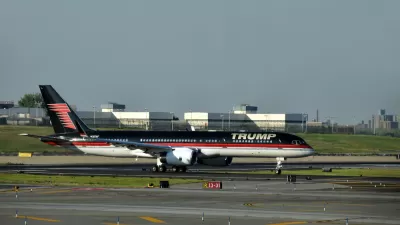The House passed their patch bill on July 15—it's now the Senate's turn at bat on highway funding. Both houses are controlled by Republicans but they appear to be pitching for different teams. A bill must pass by July 31 or road funding ceases.
The five-month, $8 billion patch bill passed by the House uses funds gained from tax compliance and extending Transportation Security Administration fees to keep the Highway Trust Fund solvent through Dec. 18. On Tuesday, it's the Senate's turn. Watch for discussion on international tax codes.
Senator Mitch McConnell, the majority leader wants a multi-year extension "at the very least, (to) get the trust fund through 2016," writes Jonathan Weisman for The New York Times. "He is trying to cobble together enough spending cuts and tax-law enforcement provisions" and a host of other measures, some of which are resisted by Democrats.
One envisions selling oil from the nation’s Strategic Petroleum Reserve, which is supposed to be tapped only for energy emergencies. Another idea would tap the huge legal settlements that the largest banks have reached with the government over the housing issues that precipitated the financial collapse of 2008.
Altogether, they would approach $60 billion, enough roughly for a four-to-five-year highway bill. But Democrats are protesting one of the largest parts, a cut to the way federal employee retirement benefits are calculated.
Repatriation and Transition Taxes
And that's where a freshman Democratic Congressman from Maryland, John Delaney, comes into play—surprisingly not only for Democrats, but for House Republicans as well. His bill may have "evolved into the closest thing to consensus on infrastructure funding," writes Weisman.
"The idea: Rewrite the tax code governing United States corporations operating internationally to end the unintended incentive for those companies to leave trillions of dollars in profits overseas, and add a component taxing those overseas profits," writes Weisman. "Much of the revenue from that one-time “transition” tax would be dedicated to infrastructure spending."
In this piece, Chye-Ching Huang and Brandon DeBot of the Center on Budget and Policy Priorities explain the difference between a transition and repatriation tax.
A transition tax is a sound policy that would raise revenues for infrastructure investments or other uses; a repatriation holiday is a tax cut that loses revenue and consequently could not pay for anything.
"There is strong momentum in both parties for using international tax reform, a fiscally-responsible pro-growth approach that will create jobs and allow us to invest in our future," states Delaney in his press release on the Infrastructure 2.0 Act. "The House has passed an extension that gives us the time we need to get a robust bipartisan six-year highway bill done."
During the House floor debate on July 15, a frustrated Paul Ryan (R-Wis.), sponsor of H.R.3038 - Highway and Transportation Funding Act of 2015, Part II, responded to calls for a multi-year bill by stating, "international tax code law can't be rewritten in two weeks," which is when the current transportation extension ends.
"Delaney’s Infrastructure 2.0 Act uses deemed repatriation at 8.75% to fund a six-year highway bill at increased levels and create a new infrastructure fund," according to Delaney. It differs from the president's proposal which taxes at 14 percent. The Tax Foundation slammed Obama's tax proposal, calling it the "Worst of Retroactive Policy."
Gas taxes anyone?
At this point you might be asking, "What about raising the gas tax?" On this this question, leaders of both parties in the House and Senate agree: Fugetaboutit!
Heather Caygle of Politico writes: "And for all those gas tax lovers out there (I’m looking at you, Chamber of Commerce and AFL-CIO), Sen. Chuck Schumer (D-N.Y.) had this to say: “No party supports raising the gas tax, including me,” he told a gaggle of reporters Thursday. “The vast majority on both parties do not support raising the gas tax. There are some individuals on each side who would be willing to do it.”
That's not a good sign for those who believe user fees should fund highways. Schumer is expected to replace Sen. Harry Reid as the next Senate Minority Leader.
Burgess Everett, congressional reporter for Politico, adds, "Senate Majority Leader Mitch McConnell on (July 8) ruled out raising the gas tax as a way to fill the Highway Trust Fund’s dwindling coffers. Without an infusion of cash, the fund will run out of money at the end of July."
FULL STORY: Mitch McConnell Casts Doubt on House’s Plan for Transportation Bill

Planetizen Federal Action Tracker
A weekly monitor of how Trump’s orders and actions are impacting planners and planning in America.

Maui's Vacation Rental Debate Turns Ugly
Verbal attacks, misinformation campaigns and fistfights plague a high-stakes debate to convert thousands of vacation rentals into long-term housing.

San Francisco Suspends Traffic Calming Amidst Record Deaths
Citing “a challenging fiscal landscape,” the city will cease the program on the heels of 42 traffic deaths, including 24 pedestrians.

Amtrak Rolls Out New Orleans to Alabama “Mardi Gras” Train
The new service will operate morning and evening departures between Mobile and New Orleans.

The Subversive Car-Free Guide to Trump's Great American Road Trip
Car-free ways to access Chicagoland’s best tourist attractions.

San Antonio and Austin are Fusing Into one Massive Megaregion
The region spanning the two central Texas cities is growing fast, posing challenges for local infrastructure and water supplies.
Urban Design for Planners 1: Software Tools
This six-course series explores essential urban design concepts using open source software and equips planners with the tools they need to participate fully in the urban design process.
Planning for Universal Design
Learn the tools for implementing Universal Design in planning regulations.
Heyer Gruel & Associates PA
JM Goldson LLC
Custer County Colorado
City of Camden Redevelopment Agency
City of Astoria
Transportation Research & Education Center (TREC) at Portland State University
Jefferson Parish Government
Camden Redevelopment Agency
City of Claremont



























